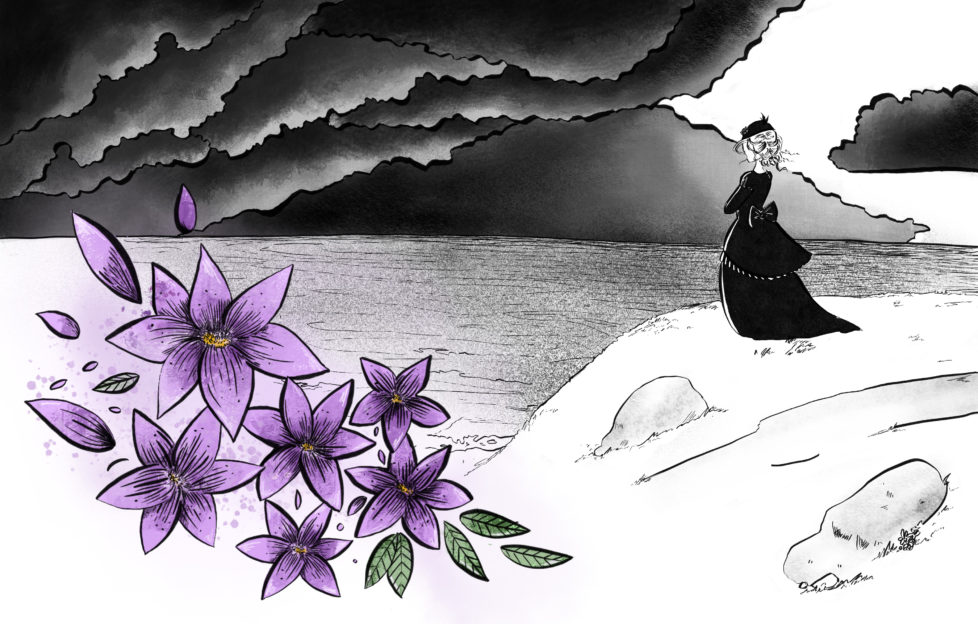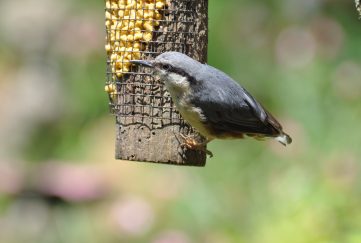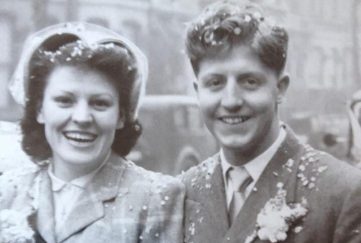“Fateful Flowers” Pt II, By Christian Byrde

Part one of this story appeared in last week’s Fiction newsletter.
“Fateful Flowers” by Christian Byrde was first published in the pages of “The People’s Friend” in December 1877.
About three weeks elapsed.
The lovers seldom found opportunity to speak, for after the bathing season their visits to the downs ceased, but they met occasionally late in the evening in the deserted street.
Once Ericson when as a pilot in a vessel to Hamburg. During his absence, Christine felt terribly anxious, but he returned safely, and with a good sum of money.
All superstitious fears then vanished from his mind, but she forgot not so easily her ill-omened forebodings.
Beyond the sandy downs lies, in an easterly direction, a vast oyster bed, and in spring and autumn the fishermen of Heligoland, besides many other inhabitants, not mariners, usually visit it, and bring back a rich harvest.
So, one bright morning in the autumn before alluded to, when a soft breeze blew from the south-west, an immense number of boats, of every form and size, prepared to depart for their Eldorado.
Women and children stood on the shore to bid the wayfarers good speed and a happy return.
They watched the departing sails which, filled by a favourable wind, soon disappeared from sight. Then all joyfully resumed their occupations, without any prevision of evil, for a blue sky and bright sunshine seemed to promise a fair evening for the travellers.
Harold Ericson formed one of the little band. Christine always felt uneasy when he ventured on the sea, but even her fears were lulled to rest, for what misfortune could happen to him in such weather, and with so many companions?
About mid-day, however, the wind veered round to the north-west, and began visibly to increase; heavy clouds which boded no good gradually covered the heavens.
The islanders grew disturbed, and cast many anxious looks in the direction of the oyster bed.
A few sloops were already arriving, in which came prudent sailors. The wind blew against them. They evidently found difficulty in battling the angry elements, but they ran as yet no danger.
Numerous groups of men and woman covered the parade, as well as the strand, alarm and apprehension depicted on their faces, for they knew not whether their dear ones belonged to the wiser emigrants.
The sky grew momentarily darker, the roaring waves dashed higher, and the wind whistled ominously.
Towards the end of the afternoon, the first boats touched the shore; others appeared on the horizon. But, alas! Too late.
Take a look at this video of Illustrations Editor Manon creating the fantastic design for this story!
The storm burst with overwhelming fury, it grew pitch dark, and a thick snow storm hid all from the eager gaze of the grief-stricken watchers. The island became a scene of heart-rending sorrow.
Here an aged widow tore her grey hair with despair for her only son, the joy and support of her declining years; yonder a fair girl-wide knelt with her bay in her arms, imploring Heaven to have mercy on her brave young husband.
Everywhere tears, lamentations, and groans. Christine stood amidst the distressed crowd. Her grief, too deep for words, kept her spell-bound; relations of her own struggled for dear life upon the deep; she thought not of them; her heart throbbed with fear and anguish for one being alone; the world held but one man for her — Harold Ericson.
No entreaties or commands of her parents could keep her at home; she believed at that supreme moment her place to be amongst the expectant assemblage on the shore.
The cruel blast swept her hair wildly over her face, the snowflakes soaked her dress; she heeded not. Her lovely face pale as death, her eyes fixed and distended, her fingers tightly clenched, she sought to penetrate the murky gloom.
No starting tears welled forth to ease her pain. She uttered no entreaty to Providence, for she felt that no meeting with Harold would be vouchsafed her in this world.
Oh! That he had never touched those fatal flowers! At last day dawned, and what a day for the despairing band upon the beach! One or two boats arrived which anchored without during the night, but many — far too many — never appeared again.
Fathers, husbands, sons, lovers, and, amongst the last, Harold Ericson, fell a prey to the all-devouring ocean.
The tiny spark of hope that smouldered until then, despite herself, in the innermost depths of Christine’s heart, expired; a sudden longing for solitude seized her, and a strange impulse urged her to seek that deserted abode of the dead, fraught to her with such bitter-sweet remembrances.
She hurried to the ferry, as if impelled by some unseen hand. One boat only remained still fastened to the shore. With eager haste she loosened the chain, jumped into the frail skiff, and, as if endowed with superhuman strength, rowed rapidly across to the sandy island through the foaming sea.
Without pausing to secure the tiny craft she jumped ashore and ran over the wet sand to that sad resting-place, which bore signs of recent submersion by the stormy waves.
She leaned for a few moments against the low, broken paling to take breath and collect her thoughts. She seemed hardly to know how she came there, but returning consciousness brought back the heart-breaking recollection of her terrible loss.
“Oh, Harold,” she cried. “Harold, I cannot live without thee, my own, own darling!”
And as, in her agony, she threw her arms out and glanced across the lonely plain, upon which the rising sun shone its golden rays, turning the tempest-tossed purple blossoms to a blood-red hue, she started and passed her hand across her eyes, as if to banish some visual delusion.
Then she looked again, and, climbing over the battered fence, tottered on, still doubting the reality of her senses.
There, where the strange plants grew thickest, lay her lover motionless. His tattered garments and bruised brow testified to a fierce battle with the elements. An expression of child-like peace pervaded his face, and almost a smile hovered around the white lips.
Christine tore open his ragged shirt and put her hand upon his heart to feel for some responsive beat; but all was still.
The passing breeze caressed his pallid brow and stirred the thick masses of his dank hair. The poor girl thought he moved; she pressed her warm lips upon his fast-shut mouth; she clasped his icy hands.
Alas! In vain; all her loving care availed naught, and when the truth burst upon her that the smiling sea had given back her lover’s corpse, but that his spirit was gone forever, this second blow proved too hard for her to bear; she gave one agonised cry, a cry so heart-rending as almost to wake the dead, and fell beside him she held so dear, never to rise again.
Her sorrowing parents discovered them some hours later, and buried them in the sandy graveyard, where the purple flowers soon covered their cold beds.
Christine held in her hand the bunch of faded flowers, the last gift of her betrothed, and on Harold’s breast they found a small embroidered bag containing a thick ringlet of his darling’s fair hair.
Click here to read more of our fantastic Fiction content.
Click here to delve into our dramatic Daily Serial.





